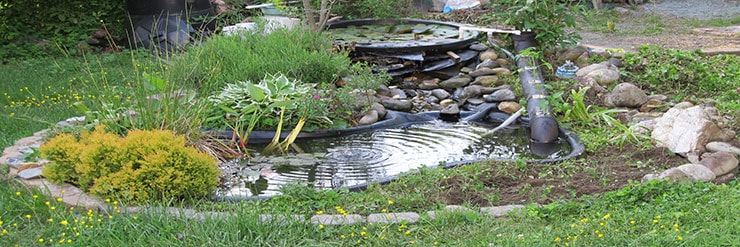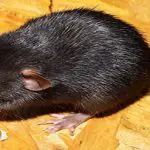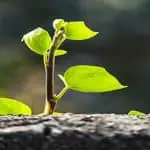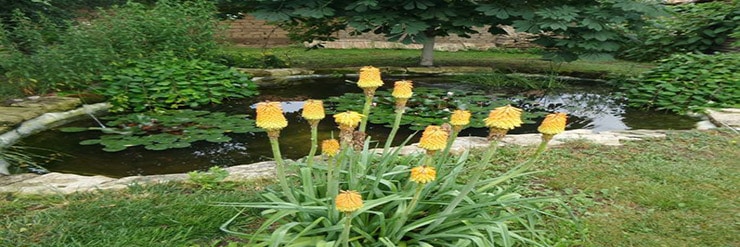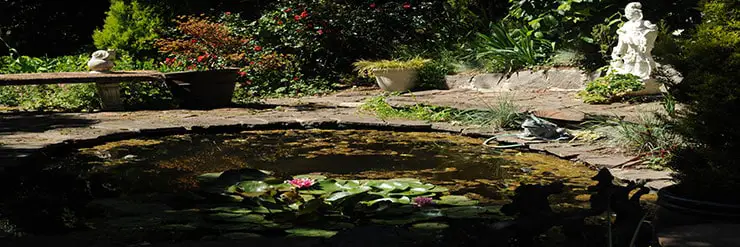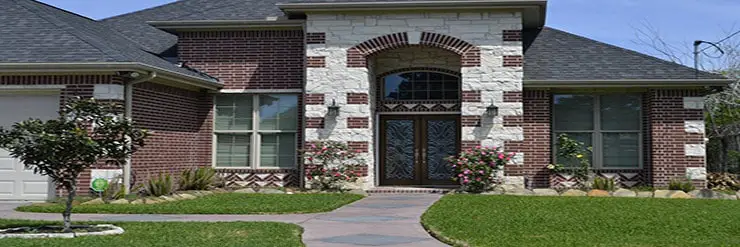Think you don’t have enough room for a garden pond? Think again! Even the smallest of gardens can accommodate a pond. Let’s take a look at how small can a garden pond be?
It depends on what you want to use the pond for. If you’re looking to keep fish in it, then a pond that is less than three feet wide and two feet deep may not be big enough. most small garden ponds are between 50 and 200 square feet.
Keep reading to learn all about small garden ponds such as permits, fish to keep, pond sizes, and how to look after a small garden pond! This post has it all, so be sure to bookmark it!
How small can a garden pond be
This is a great question and one that doesn’t have a definitive answer. Garden ponds can be as small as a few inches or as large as several acres. It really depends on your personal preference and what you’re looking to accomplish with your pond.
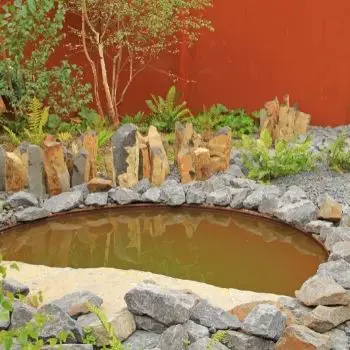
If you’re simply looking to add a bit of visual interest to your garden, then a small pond is likely all you need. However, if you’re hoping to create a habitat for wildlife or add fish to your pond, then you’ll need something larger.
In general, most garden ponds are between 50 and 200 square feet. This size is large enough to accommodate a few fish and other aquatic creatures, but small enough to fit in most yards.
The smallest pond to make if you want fish would be:
- 2 feet deep
- 3 – 4 feet wide
- 3 – 4 feet Length
- 133 gallons of water
If for example, you plan to keep a bigger fish, like Sacramento Koi, the least recommended volume for your average garden pond is about 1500 gallons, which translates to a pond 7 feet wide by 8 feet long and 4 feet deep. As you can see, this pond size is considerably larger.
How deep should a small garden pond be
A small garden pond should be at least two feet deep. This will allow for a good amount of water to be held in the pond and will also allow for fish to live comfortably in the pond.
Do you need a permit to build a small pond in your backyard?
You may need a permit to build a pond, even a small one. If you use any machinery to help construct your pond then you will more than likely need planning permission. To check if you need a permit, contact your local planning authority.
Some places won’t need a permit to build a small pond in your backyard. However, it’s always best to check with your local municipality to see if there are any special requirements or regulations in place.
If you live in an area that is prone to flooding, you may need to obtain a permit before starting any construction.
If you are planning on stocking your pond with fish, you will need to get a permit from the Department of Natural Resources. Depending on the size of your pond and the species of fish you plan on keeping, there may be other requirements that need to be met. Contact your local DNR office for more information.
Can you keep fish in a small pond
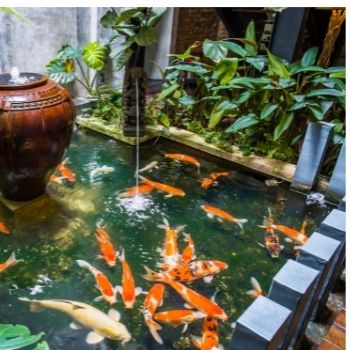
You can keep fish in a small pond, but there are a few things to consider.
The size of the pond will determine how many fish you can keep, and the type of fish will also play a role.
If you have a smaller pond, it’s best to stick with just a few fish, and if you have a larger pond, you can keep more fish.
A pond that is 2 ft deep and 3-4 feet wide and the same in length, would be the smallest recommended for a small fish pond.
Just be sure to do your research so you don’t overcrowd your pond and cause problems for your fish.
The best fish for a small garden pond
If we take a small 133-gallon garden pond, some ideal fish might be:
Common Goldfish
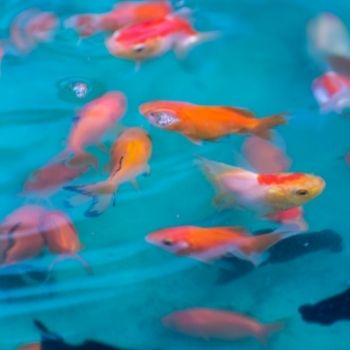
These are the classic fish often seen in ponds, and they’re a great choice for a beginner. They’re very hardy and can tolerate a wide range of water conditions. They’re also relatively cheap, so you can get a few without breaking the bank.
Fathead Minnow
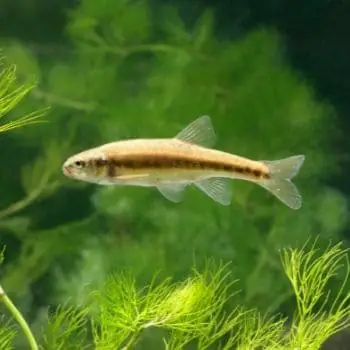
These fish are also small, only getting to be about 3” in length. Minnows are an incredibly popular choice for small garden ponds due to their peaceful nature and modest size. They’re also very easy to care for, and they don’t require a lot of fancy equipment or special conditions.
Mosquito Fish
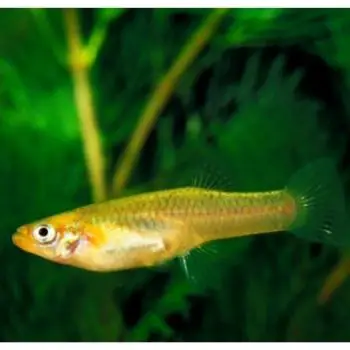
They are effective at eating mosquito larvae and can help to control the mosquito population around your pond. A small group of these fish will do well in a garden pond.
Sticklebacks
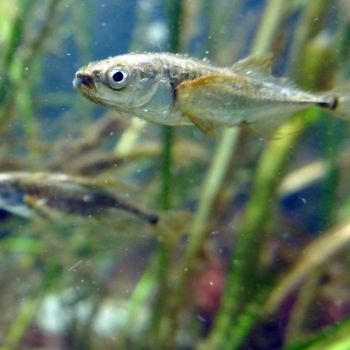
Three-spined sticklebacks are a common freshwater fish found in ponds and streams all over the northern hemisphere. These 5 to 6 inch long fish are brown or olive green in color with dark spots along their sides. Sticklebacks are relatively easy to care for and make a great addition to any small pond.
Red Shiners
These fish are very small, only getting to be about 2.5” in length. They are great for a garden pond because they don’t need very much space and they don’t grow too large. They are also very peaceful fish and they are good at eating algae.
what do I need for a small garden pond
There’s no one definitive answer to this question since the necessary supplies will vary depending on the size and depth of your pond, as well as the climate you live in. However, some of the basics you’ll need to get started include a pond liner, a pump, tubing, and a filter. You’ll also need rocks or other materials to create a border around your pond, and plants to help purify the water and provide shelter for wildlife.
Do i need a filter for a small pond
You don’t necessarily need a filter for a small pond, but it can help to keep the water clean and clear. If you have fish, a filter can also provide them with a better environment.
Related article:
Does a small garden pond need a pump?
A small garden pond does not require a pump if the pond is connected to a water source, such as a creek or spring. The water source will keep the pond full and provide aeration.
Pumps are only necessary if the pond is not connected to a water source. If you just have a stand along a small garden pond with fish then you will need a pump to keep the water aerated and the fish alive. The pump also helps to circulate the water and keep it clean.
How to care for a small garden pond
A small garden pond can be a beautiful addition to your yard, and it can provide a home for a variety of wildlife. If you have a pond, you will need to take care of it to keep it healthy and functioning properly. Here are some tips on how to care for a small garden pond:
- Pond water should be circulated to keep it fresh and oxygenated. You can do this with a pump or by aerating the water with a bubbler.
- Pond plants are important for oxygenating the water and providing habitat for wildlife. Choose native plants that are appropriate for your climate zone.
- Ponds should be kept clean by removing debris and dead leaves on a regular basis. You may also want to use a pond vacuum to remove muck from the bottom of the pond.
- A small garden pond can be a great home for fish, frogs, and other aquatic creatures. Choose species that are compatible and will not overpopulate your pond.
By following these tips, you can keep your small garden pond healthy and beautiful for years to come.
Conclusion
So, how small can a garden pond be? Whether you’re looking for a small, decorative pond or something larger to accommodate wildlife and fish, it’s important that the size of your garden pond match the space you have available.
A good rule of thumb is between 50-200 square feet – this way, you can enjoy all the benefits of having a beautiful water feature in your yard without feeling overwhelmed

